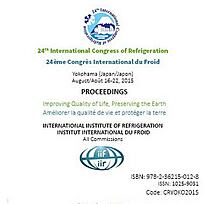
Document IIF
Analyse de la performance d'un système de chauffage d'eau à pompe à chaleur utilisant en cascade la chaleur résiduelle des eaux usées.
Performance analysis of heat pump water heating system with cascade utilization of waste heat from wastewater.
Résumé
Wastewater heat pump water heater (WHPWH) can be used to recover waste heat from industrial or domestic wastewater with high efficiency. In this study, a WHPWH system was proposed and its performance was theoretical analyzed. The proposed system includes a preheating heat exchanger and a water source heat pump. The fresh water is preheated by wastewater then heated to the desired temperature by water source heat pump. Thus, the waste heat of wastewater can be cascaded recovered through preheating the fresh water and being the heat source of the heat pump. A thermodynamic model was developed to evaluate and optimize the performance of the proposed WHPWH. The energetic analysis was carried out to investigate the influences of the temperature of the wastewater, the inlet and the outlet temperatures of fresh water. The results were compared to the system which only uses wastewater to preheating or as heat source of heat pump, and showed a significantly higher waste heat utilization rate.
Documents disponibles
Format PDF
Pages : 6 p.
Disponible
Prix public
20 €
Prix membre*
Gratuit
* meilleur tarif applicable selon le type d'adhésion (voir le détail des avantages des adhésions individuelles et collectives)
Détails
- Titre original : Performance analysis of heat pump water heating system with cascade utilization of waste heat from wastewater.
- Identifiant de la fiche : 30015034
- Langues : Anglais
- Source : Proceedings of the 24th IIR International Congress of Refrigeration: Yokohama, Japan, August 16-22, 2015.
- Date d'édition : 16/08/2015
- DOI : http://dx.doi.org/10.18462/iir.icr.2015.0902
Liens
Voir d'autres communications du même compte rendu (657)
Voir le compte rendu de la conférence
Indexation
-
Performance analysis of an open cycled AHP for ...
- Auteurs : ZHENG J., CHEN G., YE B.
- Date : 02/03/2014
- Langues : Anglais
- Source : International sorption heat pump conference (ISHPC2014), College Park, United States, March 31-April 2, 2014.
- Formats : PDF
Voir la fiche
-
Organic Rankine cycles combined with thermochem...
- Auteurs : MANENTE G., DING Y., SCIACOVELLI A.
- Date : 31/07/2020
- Langues : Anglais
- Source : IIR Rankine Conference 2020.
- Formats : PDF
Voir la fiche
-
Study on the condensing heat recovery optimum m...
- Auteurs : ZHOU E. Z., FAN B., DONG H.
- Date : 05/04/2008
- Langues : Anglais
- Source : Cryogenics and refrigeration. Proceedings of ICCR'2008.
Voir la fiche
-
Parametric study of a groundwater heat pump hou...
- Auteurs : STAICOVICI M. D. N.
- Date : 21/08/2011
- Langues : Anglais
- Source : Proceedings of the 23rd IIR International Congress of Refrigeration: Prague, Czech Republic, August 21-26, 2011. Overarching theme: Refrigeration for Sustainable Development.
- Formats : PDF
Voir la fiche
-
Experimental study on heating performance of a ...
- Auteurs : AHN J. H., HEO J. H., KANG H., et al.
- Date : 21/08/2011
- Langues : Anglais
- Source : Proceedings of the 23rd IIR International Congress of Refrigeration: Prague, Czech Republic, August 21-26, 2011. Overarching theme: Refrigeration for Sustainable Development.
- Formats : PDF
Voir la fiche
